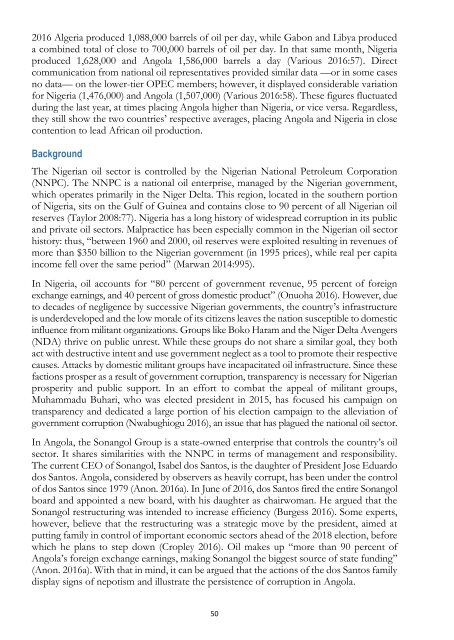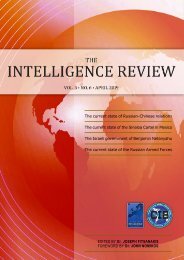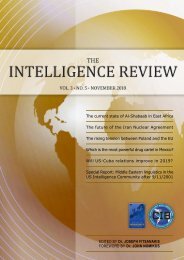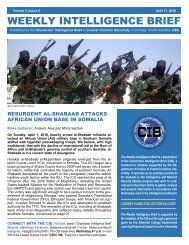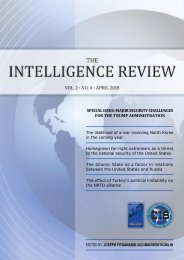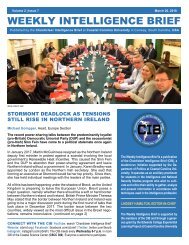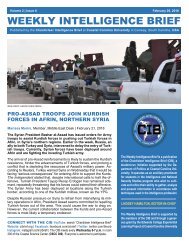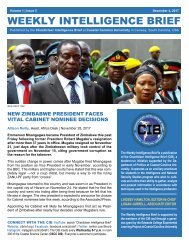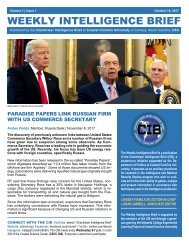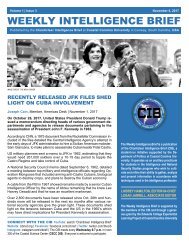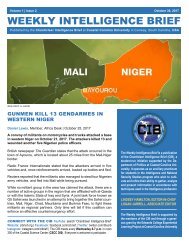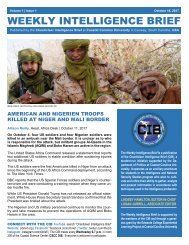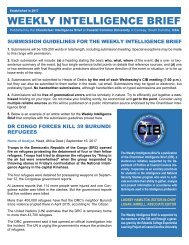The Intelligence Review | volume 1 | issue 2 |
This volume is the product of a collaboration between the European Intelligence Academy (EIA) and the Chanticleer Intelligence Brief (CIB), a student-run initiative supported by the Department of Politics at Coastal Carolina University in Conway, South Carolina, United States. Eleven CIB analysts tackle some of the most pressing and timely questions confronting intelligence observers today. Topics include the gun control debate in the United States, Russia’s involvement in the Syrian Civil War, the future of Kurdish nationalism, and the internal Palestinian dispute between Hamas and Fatah. Papers in this volume also examine the current state of Islamist extremism, and extrapolate on its future prospects in the Middle East, West Africa, the Lake Chad region, as well as in Southeast and Central Asia. CIB analysts propose carefully crafted and informed forecasts that outline future developments in some of the world's most unpredictable hot spots.
This volume is the product of a collaboration between the European Intelligence Academy (EIA) and the Chanticleer Intelligence Brief (CIB), a student-run initiative supported by the Department of Politics at Coastal Carolina University in Conway, South Carolina, United States. Eleven CIB analysts tackle some of the most pressing and timely questions confronting intelligence observers today. Topics include the gun control debate in the United States, Russia’s involvement in the Syrian Civil War, the future of Kurdish nationalism, and the internal Palestinian dispute between Hamas and Fatah. Papers in this volume also examine the current state of Islamist extremism, and extrapolate on its future prospects in the Middle East, West Africa, the Lake Chad region, as well as in Southeast and Central Asia. CIB analysts propose carefully crafted and informed forecasts that outline future developments in some of the world's most unpredictable hot spots.
- No tags were found...
Create successful ePaper yourself
Turn your PDF publications into a flip-book with our unique Google optimized e-Paper software.
2016 Algeria produced 1,088,000 barrels of oil per day, while Gabon and Libya produced<br />
a combined total of close to 700,000 barrels of oil per day. In that same month, Nigeria<br />
produced 1,628,000 and Angola 1,586,000 barrels a day (Various 2016:57). Direct<br />
communication from national oil representatives provided similar data —or in some cases<br />
no data— on the lower-tier OPEC members; however, it displayed considerable variation<br />
for Nigeria (1,476,000) and Angola (1,507,000) (Various 2016:58). <strong>The</strong>se figures fluctuated<br />
during the last year, at times placing Angola higher than Nigeria, or vice versa. Regardless,<br />
they still show the two countries’ respective averages, placing Angola and Nigeria in close<br />
contention to lead African oil production.<br />
Background<br />
<strong>The</strong> Nigerian oil sector is controlled by the Nigerian National Petroleum Corporation<br />
(NNPC). <strong>The</strong> NNPC is a national oil enterprise, managed by the Nigerian government,<br />
which operates primarily in the Niger Delta. This region, located in the southern portion<br />
of Nigeria, sits on the Gulf of Guinea and contains close to 90 percent of all Nigerian oil<br />
reserves (Taylor 2008:77). Nigeria has a long history of widespread corruption in its public<br />
and private oil sectors. Malpractice has been especially common in the Nigerian oil sector<br />
history: thus, “between 1960 and 2000, oil reserves were exploited resulting in revenues of<br />
more than $350 billion to the Nigerian government (in 1995 prices), while real per capita<br />
income fell over the same period” (Marwan 2014:995).<br />
In Nigeria, oil accounts for “80 percent of government revenue, 95 percent of foreign<br />
exchange earnings, and 40 percent of gross domestic product” (Onuoha 2016). However, due<br />
to decades of negligence by successive Nigerian governments, the country’s infrastructure<br />
is underdeveloped and the low morale of its citizens leaves the nation susceptible to domestic<br />
influence from militant organizations. Groups like Boko Haram and the Niger Delta Avengers<br />
(NDA) thrive on public unrest. While these groups do not share a similar goal, they both<br />
act with destructive intent and use government neglect as a tool to promote their respective<br />
causes. Attacks by domestic militant groups have incapacitated oil infrastructure. Since these<br />
factions prosper as a result of government corruption, transparency is necessary for Nigerian<br />
prosperity and public support. In an effort to combat the appeal of militant groups,<br />
Muhammadu Buhari, who was elected president in 2015, has focused his campaign on<br />
transparency and dedicated a large portion of his election campaign to the alleviation of<br />
government corruption (Nwabughiogu 2016), an <strong>issue</strong> that has plagued the national oil sector.<br />
In Angola, the Sonangol Group is a state-owned enterprise that controls the country’s oil<br />
sector. It shares similarities with the NNPC in terms of management and responsibility.<br />
<strong>The</strong> current CEO of Sonangol, Isabel dos Santos, is the daughter of President Jose Eduardo<br />
dos Santos. Angola, considered by observers as heavily corrupt, has been under the control<br />
of dos Santos since 1979 (Anon. 2016a). In June of 2016, dos Santos fired the entire Sonangol<br />
board and appointed a new board, with his daughter as chairwoman. He argued that the<br />
Sonangol restructuring was intended to increase efficiency (Burgess 2016). Some experts,<br />
however, believe that the restructuring was a strategic move by the president, aimed at<br />
putting family in control of important economic sectors ahead of the 2018 election, before<br />
which he plans to step down (Cropley 2016). Oil makes up “more than 90 percent of<br />
Angola’s foreign exchange earnings, making Sonangol the biggest source of state funding”<br />
(Anon. 2016a). With that in mind, it can be argued that the actions of the dos Santos family<br />
display signs of nepotism and illustrate the persistence of corruption in Angola.<br />
50


